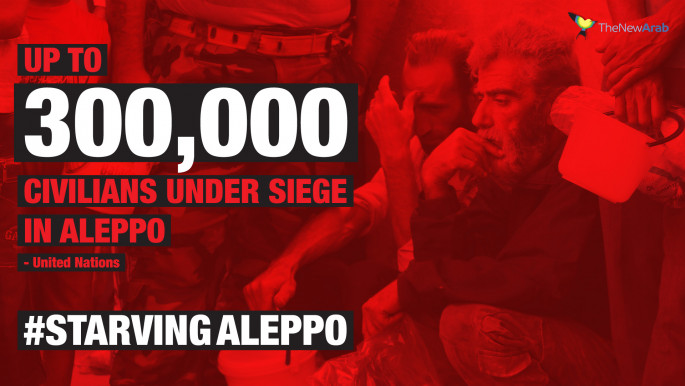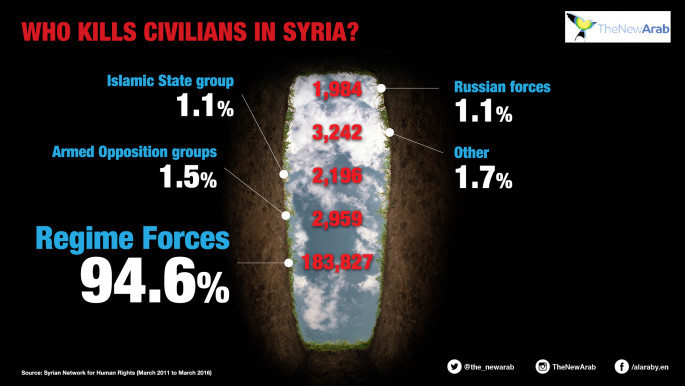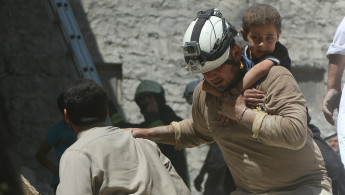No real exit: World criticises regime's Aleppo 'humanitarian corridors'
De Mistura voiced provisional support for the humanitarian passages proposed by Moscow, but said the UN wanted to see key changes to the plan.
"Our suggestion is to Russia to actually leave the corridors being established at their initiative to us," de Mistura told reporters in Geneva, "The UN and humanitarian partners know what to do."
He also echoed calls by UN humanitarian chief Stephen O'Brien for a 48-hour truce to allow life-saving supplies into the city's rebel-held east, which has been surrounded by pro-government forces since 17 July.
"How can you expect people to want to walk through a corridor, thousands of them, while there is shelling, bombing fighting," the UN envoy said.
Russia said it will "carefully study and take into account" suggestions made by de Mistura, RIA news agency quoted Alexei Borodavkin, Russia's ambassador to the United Nations in Geneva, as saying.
 |
| [Click to enlarge] |
After months of fighting to encircle rebel-held areas in Aleppo, the Syrian regime and its Russian ally offered on Thursday safe corridors out for residents and rebels in the northern city's besieged quarters, in attempt to underline the Bashar al-Assad's government's determination to seal off the ancient city and force an eventual surrender by the opposition.
'Not a credible solution'
France's foreign ministry said the humanitarian corridors were not a "credible solution."
"International humanitarian law demands that aid must be sent urgently. The residents of Aleppo must be able to stay home in security and receive all the aid they need," said ministry spokesman Romain Nadal.
"In this context, humanitarian corridors, which require residents of Aleppo to leave the city, do not represent a credible response to the situation."
 |
The residents of Aleppo must be able to stay home in security and receive all the aid they need - Foreign Ministry of France |
 |
Many residents in the besieged area dismissed the offer, saying it presents them with an impossible choice between a slow death if they stay behind and possible detention if they attempt to leave.
"If Assad shows that he is winning Aleppo, and he's now also advancing on the rebels in Damascus, it could trigger a more dramatic shift by finally convincing opposition groups that they have lost the war," said Aron Lund, non-resident associate of the Carnegie Endowment for International Peace.
Rebels and civilians in Aleppo were deeply sceptical of the offer, and there was no sign of people massing to leave the besieged parts of the city.
"I will not leave. I will be the last man in the city," Mohammed Zein Khandakani, a 28-year-old resident of the Maadi neighborhood of Aleppo who volunteers with the city's medical council told AP, "I can't imagine ever seeing a member of this regime one more time."
But Khandakani, formerly a lawyer who was detained for a month in the early days of the protests against the Syrian government, said he was worried about his family.
 |
| [Click to enlarge] |
A father of two, the youngest a girl of 9 months, he said despite the risk of maltreatment and even arrest, he is urging his mother, wife and sister to use the safe passages to leave the city.
He said he hopes the Russian role and intense international attention to the humanitarian corridors proposition means the government would abstain from flagrant violations.
Others were worried that if women and children left the city the Syrian regime will intensify its bombing campaign under the pretext that only rebels remain inside Aleppo.
Meanwhile the media office for the opposition's civil defence search and rescue group in east Aleppo said no safe corridors were opened yet.
 |
Most of the men, everyone here, is wanted by the regime. So, what amnesty? - Ibrahim Haj, director of the media office in Aleppo |
 |
The director of the media office in Aleppo, Ibrahim Haj said families would probably send their women and children through the corridors if they were deemed secure enough but not men.
"Most of the men, everyone here, is wanted by the regime," said Haj. "So, what amnesty?"
Safety corridors 'do not avert humanitarian catastrophe'
Rights groups criticised the plan warning against a stop in the flow of aid into the city and using the offer as a carte blanche to further blockade the opposition-controlled territory.
"Providing safe routes for those civilians who wish to flee Aleppo city will not avert a humanitarian catastrophe," Amnesty International said in a statement, "It is not a substitute for allowing impartial humanitarian relief for civilians who remain in opposition-held areas of the city or other besieged areas, many of whom will be skeptical about government promises."
"The fact that you provide this option doesn't mean that the people who stay behind are legitimate military targets," said Nadim Houry, the deputy Middle East director at Human Rights Watch, told AP.
Youssef Rahal, a lawyer from Aleppo who left the city 10 days ago but remains in touch with people inside, said there is no way to bring in vegetables or diesel, which rebel-held areas used to buy from the market and transport through the now blockaded Castello road.
This has impacted bread production. "It means some people are getting only a quarter loaf of bread a day," he said.
The UN said that Aleppo is now possibly the largest besieged area in Syria, with an estimated 300,000 residents inside and humanitarian groups have warned of a major catastrophe if the siege continues.
Pro-regime forces surrounded the city's eastern districts in July, leaving civilians trapped without reliable access to food or medical aid.
"The clock is ticking for the Aleppo population," UN Syrian envoy said, estimating that essential supplies including food in the east were likely to run out within three weeks.
 |
Analysts say that losing Aleppo would be a major blow for the armed opposition and could signal a turning point in the conflict |  |
On Friday, there were reports the rebels were preventing civilians from leaving opposition-held Aleppo by rebels via regime-provided corridors.
It was not clear whether the rebels are concerned for the civilians' safety or whether they are concerned an exodus of civilians would invite further regime brutality.
Ahmad Ramadan from the opposition Syrian National Coalition accused Russia and the regime of forcing civilians to flee through continued bombing raids.
What is happening now is not battles, but the complete and systematic destruction of the city and its residents, whether they are civilians or fighters," he said.
Analysts say that losing Aleppo would be a major blow for the armed opposition and could signal a turning point in the conflict, which began in 2011 with the brutal crackdown of anti-government protests.
"In Aleppo, getting civilians to leave would both serve its (regime) propaganda and its military objectives," said Emile Hokayem, senior fellow at the International Institute for Strategic Studies.
"The regime uses massive, indiscriminate force to brutalise civilians to force them to kneel or reject the rebel groups," he said of regime tactics.
Agencies contributed to this report


![President Pezeshkian has denounced Israel's attacks on Lebanon [Getty]](/sites/default/files/styles/image_684x385/public/2173482924.jpeg?h=a5f2f23a&itok=q3evVtko)



 Follow the Middle East's top stories in English at The New Arab on Google News
Follow the Middle East's top stories in English at The New Arab on Google News


